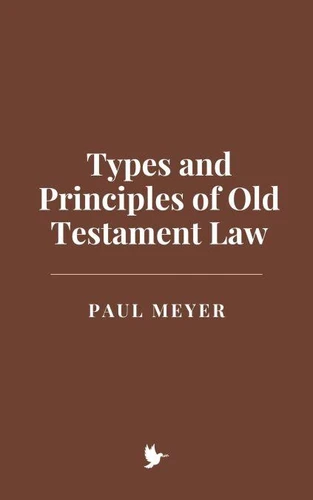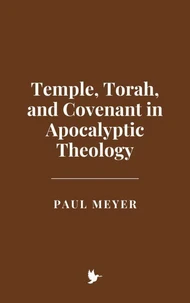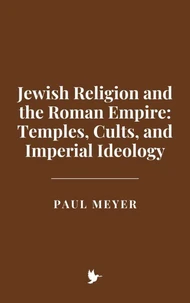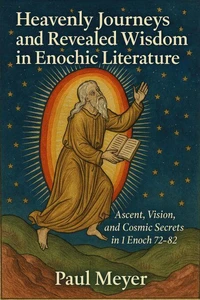Types and Principles of Old Testament Law
Par :Formats :
Disponible dans votre compte client Decitre ou Furet du Nord dès validation de votre commande. Le format ePub est :
- Compatible avec une lecture sur My Vivlio (smartphone, tablette, ordinateur)
- Compatible avec une lecture sur liseuses Vivlio
- Pour les liseuses autres que Vivlio, vous devez utiliser le logiciel Adobe Digital Edition. Non compatible avec la lecture sur les liseuses Kindle, Remarkable et Sony
 , qui est-ce ?
, qui est-ce ?Notre partenaire de plateforme de lecture numérique où vous retrouverez l'ensemble de vos ebooks gratuitement
Pour en savoir plus sur nos ebooks, consultez notre aide en ligne ici
- FormatePub
- ISBN8224706211
- EAN9798224706211
- Date de parution02/02/2025
- Protection num.pas de protection
- Infos supplémentairesepub
- ÉditeurVirtued Press
Résumé
This book provides a comprehensive exploration of the history, principles, and evolution of Old Testament law, examining its foundational role in the religious, social, and ethical life of ancient Israel. It delves into the context in which these laws were given, their theological underpinnings, and the practical implications for the Israelite community. Through a deep analysis of key legal concepts such as justice, mercy, sacrifice, and restitution, the book highlights the multifaceted nature of the law and its relationship with Israel's covenantal identity.
The work also addresses the influence of external forces, including the Hellenistic period and the Babylonian exile, on the development and transformation of Israelite law and worship practices. The book examines the role of the Temple and the sacrificial system as central to Israelite religious practice, reflecting the divine order and the means by which the Israelites could maintain their relationship with God.
Additionally, the text explores the prophetic voices that called Israel back to covenant faithfulness and provided moral guidance, particularly in times of crisis and exile. Drawing on primary sources such as the Torah, the writings of the prophets, and wisdom literature, the book provides a historical and theological framework that illuminates the complexities of ancient Israelite law. Furthermore, the book traces the cultural and intellectual shifts brought about by the encounter between Jewish tradition and Hellenistic philosophy, illustrating how these influences shaped the Jewish legal and identity structures.
The themes of divine justice, mercy, and human responsibility emerge as central to understanding Israel's legal system, with implications for later Jewish thought and Christian theology. Ultimately, this work underscores the enduring legacy of Old Testament law in shaping the religious and ethical landscape of the Abrahamic faiths, offering insight into the development of Judaism, Christianity, and their shared moral foundations.
The work also addresses the influence of external forces, including the Hellenistic period and the Babylonian exile, on the development and transformation of Israelite law and worship practices. The book examines the role of the Temple and the sacrificial system as central to Israelite religious practice, reflecting the divine order and the means by which the Israelites could maintain their relationship with God.
Additionally, the text explores the prophetic voices that called Israel back to covenant faithfulness and provided moral guidance, particularly in times of crisis and exile. Drawing on primary sources such as the Torah, the writings of the prophets, and wisdom literature, the book provides a historical and theological framework that illuminates the complexities of ancient Israelite law. Furthermore, the book traces the cultural and intellectual shifts brought about by the encounter between Jewish tradition and Hellenistic philosophy, illustrating how these influences shaped the Jewish legal and identity structures.
The themes of divine justice, mercy, and human responsibility emerge as central to understanding Israel's legal system, with implications for later Jewish thought and Christian theology. Ultimately, this work underscores the enduring legacy of Old Testament law in shaping the religious and ethical landscape of the Abrahamic faiths, offering insight into the development of Judaism, Christianity, and their shared moral foundations.
This book provides a comprehensive exploration of the history, principles, and evolution of Old Testament law, examining its foundational role in the religious, social, and ethical life of ancient Israel. It delves into the context in which these laws were given, their theological underpinnings, and the practical implications for the Israelite community. Through a deep analysis of key legal concepts such as justice, mercy, sacrifice, and restitution, the book highlights the multifaceted nature of the law and its relationship with Israel's covenantal identity.
The work also addresses the influence of external forces, including the Hellenistic period and the Babylonian exile, on the development and transformation of Israelite law and worship practices. The book examines the role of the Temple and the sacrificial system as central to Israelite religious practice, reflecting the divine order and the means by which the Israelites could maintain their relationship with God.
Additionally, the text explores the prophetic voices that called Israel back to covenant faithfulness and provided moral guidance, particularly in times of crisis and exile. Drawing on primary sources such as the Torah, the writings of the prophets, and wisdom literature, the book provides a historical and theological framework that illuminates the complexities of ancient Israelite law. Furthermore, the book traces the cultural and intellectual shifts brought about by the encounter between Jewish tradition and Hellenistic philosophy, illustrating how these influences shaped the Jewish legal and identity structures.
The themes of divine justice, mercy, and human responsibility emerge as central to understanding Israel's legal system, with implications for later Jewish thought and Christian theology. Ultimately, this work underscores the enduring legacy of Old Testament law in shaping the religious and ethical landscape of the Abrahamic faiths, offering insight into the development of Judaism, Christianity, and their shared moral foundations.
The work also addresses the influence of external forces, including the Hellenistic period and the Babylonian exile, on the development and transformation of Israelite law and worship practices. The book examines the role of the Temple and the sacrificial system as central to Israelite religious practice, reflecting the divine order and the means by which the Israelites could maintain their relationship with God.
Additionally, the text explores the prophetic voices that called Israel back to covenant faithfulness and provided moral guidance, particularly in times of crisis and exile. Drawing on primary sources such as the Torah, the writings of the prophets, and wisdom literature, the book provides a historical and theological framework that illuminates the complexities of ancient Israelite law. Furthermore, the book traces the cultural and intellectual shifts brought about by the encounter between Jewish tradition and Hellenistic philosophy, illustrating how these influences shaped the Jewish legal and identity structures.
The themes of divine justice, mercy, and human responsibility emerge as central to understanding Israel's legal system, with implications for later Jewish thought and Christian theology. Ultimately, this work underscores the enduring legacy of Old Testament law in shaping the religious and ethical landscape of the Abrahamic faiths, offering insight into the development of Judaism, Christianity, and their shared moral foundations.






















